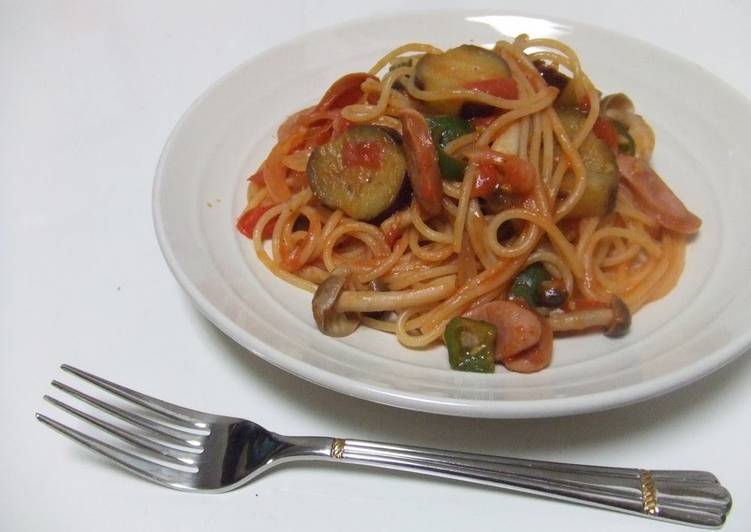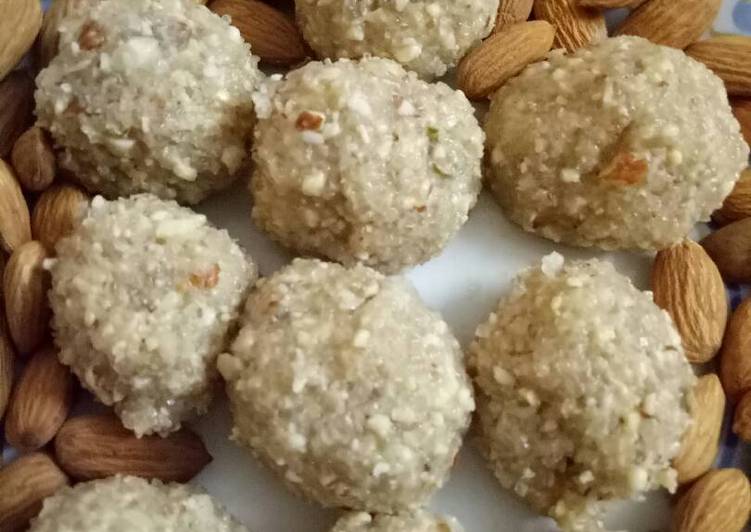
Hey everyone, it’s Louise, welcome to my recipe page. Today, we’re going to prepare a special dish, my daughter's favorite veggie-filled napolitan spaghetti. One of my favorites. This time, I am going to make it a little bit tasty. This is gonna smell and look delicious.
Spaghetti napolitan, also known as spaghetti naporitan, is a Japanese style pasta dish made with a sauce that is tomato ketchup based. This particular style of Japanese pasta is considered "yoshoku" cuisine, or western cuisine with unique Japanese influences. Spaghetti Napolitan sounds like an Italian dish; however, it is a very popular Japanese pasta dish, a mealtime favorite across Japan.
My Daughter's Favorite Veggie-Filled Napolitan Spaghetti is one of the most well liked of recent trending foods on earth. It is appreciated by millions every day. It’s simple, it is quick, it tastes delicious. They are fine and they look fantastic. My Daughter's Favorite Veggie-Filled Napolitan Spaghetti is something which I’ve loved my whole life.
To begin with this particular recipe, we must prepare a few components. You can cook my daughter's favorite veggie-filled napolitan spaghetti using 9 ingredients and 10 steps. Here is how you cook that.
The ingredients needed to make My Daughter's Favorite Veggie-Filled Napolitan Spaghetti:
- Prepare 150 grams Pasta
- Get 1 or 2 Wiener sausages or bacon
- Make ready 1 Eggplants
- Make ready 1 Tomato
- Make ready 1/2 bunch Shimeji mushrooms
- Get 1/4 Onion
- Make ready 1 Green pepper
- Get 3 slices, minced Garlic
- Make ready 3 tbsp Ketchup
Napolitan spaghetti (no, not Neapolitan) isn't technically wafu, but rather youshoku or Western-style Japanese — the difference is subtle, and involves the With limited supplies due to wartime shortages, hotel chef Shigetada Irie concocted the first napolitan spaghetti using what he had — canned tomato. A pasta dish ' Napolitan' is most popular spaghetti in Japan. Noodle was influenced to Europe, especially Italia, from China. There is a legend of Marco Polo importing pasta from China which originated with the Macaroni Journal, published by an association of food industries with the goal of. napolitan spaghetti.
Steps to make My Daughter's Favorite Veggie-Filled Napolitan Spaghetti:
- Cut the vegetables and the wieners into bite-sized pieces. Dice the tomato.
- Add 2 tablespoons of olive oil to a pan and lightly heat the garlic until fragrant. Heat on low or medium to not burn the garlic.
- Once the garlic is aromatic, add the vegetables and wieners. Line up the eggplant in the pan and cook thoroughly.
- Begin to boil the pasta. We boil with a quite a bit of salt.
- When the eggplant is coated with oil and both sides look deliciously cooked, add one ladle of pasta water.
- Have the oil blend with the pasta water and emulsify. This makes for a delicious pasta.
- Once emulsified, add the tomatoes. Add a little salt and pepper. (Be sure to adjust depending on how much salt you used in the pasta water.)
- Once the pasta has finished boiling, add it to the pan. Stir the tomatoes and pasta together with chopsticks or a wooden spoon.
- Add ketchup and mix well.
- Place on a plate and you're done.
This popular Japanese dish, spaghetti Napolitan, features a ketchup-based sauce and Spaghetti Napolitan is a popular Japanese pasta dish. Add spaghetti and salt; cook, stirring occasionally. In the motif as a "Napolitan fairy who was born to make everyone's stomach and heart full with Spaghetti Napolitan," she is designed by Mika Pikazo, who has worked on many light novel cover illustrations including Ai Iwazawa's Kirapuri Ojisan to Youjo Senpai. It is also confirmed that the. It's spaghetti with ham, vegetables, and Kagome brand ketchup is the secret to this dish.
So that is going to wrap it up with this exceptional food my daughter's favorite veggie-filled napolitan spaghetti recipe. Thank you very much for reading. I am confident you will make this at home. There’s gonna be interesting food at home recipes coming up. Remember to save this page in your browser, and share it to your family, friends and colleague. Thank you for reading. Go on get cooking!

